Introductory Clinical Pharmacology Study guides, Class notes & Summaries
Looking for the best study guides, study notes and summaries about Introductory Clinical Pharmacology? On this page you'll find 153 study documents about Introductory Clinical Pharmacology.
Page 3 out of 153 results
Sort by
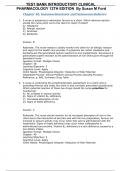
-
Chapter 48, Immunostimulants and Immunomodulators TEST BANK INTRODUCTORY CLINICAL PHARMACOLOGY 12TH EDITION By Susan M Ford
- Exam (elaborations) • 14 pages • 2024
- Available in package deal
-
- $4.04
- + learn more
1. A nurse is preparing to administer ferrous to a client. Which adverse reaction should the nurse point out to the client to report if noted? A) Headache B) Allergic reaction C) Soreness D) Backache Answer: B Rationale: The nurse needs to closely monitor the client for an allergic reaction and report to the health care provider if symptoms are noted. Headache and backache are the generalized system reactions to iron supplements. Soreness is a generalized system reaction to the adminis...
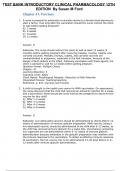
-
Chapter 47, Vaccines TEST BANK INTRODUCTORY CLINICAL PHARMACOLOGY 12TH EDITION By Susan M Ford
- Exam (elaborations) • 15 pages • 2024
- Available in package deal
-
- $3.01
- + learn more
1. A nurse is prepared to administer a varicella vaccine to a female client planning to start a family. How long after the vaccination should the nurse instruct the client to wait before getting pregnant? A) 2 weeks B) 4 weeks C) 8 weeks D) 12 weeks Answer: D Rationale: The nurse should instruct the client to wait at least 12 weeks (3 months) before getting pregnant after receiving measles, mumps, rubella, and varicella vaccines. Measles, mumps, rubella, and varicella vaccines are con...
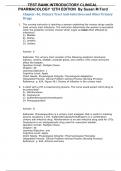
-
Chapter: 46, Urinary Tract Anti-Infectives and Other Urinary Drugs TEST BANK INTRODUCTORY CLINICAL PHARMACOLOGY 12TH EDITION By Susan M Ford
- Exam (elaborations) • 14 pages • 2024
- Available in package deal
-
- $2.99
- 1x sold
- + learn more
1. The nursing instructor is teaching a session explaining the various drugs usedto treat urinary tract infections. The instructor determines the session is successful when the students correctly choose which organ as most often affected by infections? A) Bladder B) Kidney C) Urethra D) Ureters Answer: A Rationale: The urinary tract consists of the following anatomic structures: kidneys, ureters, bladder, prostate gland, and urethra. UTIs most commonly affect the bladder. Question fo...
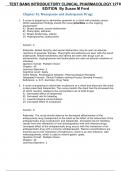
-
Chapter 45, Menopause and Andropause Drugs TEST BANK INTRODUCTORY CLINICAL PHARMACOLOGY 12TH EDITION By Susan M Ford
- Exam (elaborations) • 14 pages • 2024
- Available in package deal
-
- $3.04
- 1x sold
- + learn more
1. A nurse is preparing to administer goserelin to a client with prostate cancer. Which assessment findings should the nurse prioritize on the ongoing assessment? A) Breast atrophy, sexual dysfunction B) Pharyngitis, asthenia C) Breast tenderness, edema D) Hyperglycemia, leukocytosis Answer: A Rationale: Breast atrophy and sexual dysfunction may be seen as adverse reactions of goserelin therapy. Pharyngitis and asthenia are seen with the useof anastrozole. Breast tenderness and edema a...
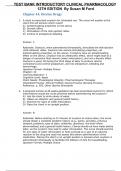
-
Chapter 44, Uterine Drugs TEST BANK INTRODUCTORY CLINICAL PHARMACOLOGY 12TH EDITION By Susan M Ford
- Exam (elaborations) • 16 pages • 2024
- Available in package deal
-
- $3.09
- + learn more
1. A client is prescribed oxytocin for intranasal use. The nurse will explain to the client this will achieve which result? A) Antistimulating properties on the uterus B) Diuretic effect C) Stimulation of the milk ejection reflex D) Control of antepartum bleeding Answer: C Rationale: Oxytocin, when administered intranasally, stimulates the milk ejection (milk letdown) reflex. Oxytocin has uterine-stimulating properties, not antistimulating properties, on the uterus. Tocolytics have an a...
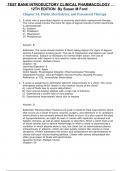
-
Chapter 54, Fluids, Electrolytes, and Parenteral Therapy TEST BANK INTRODUCTORY CLINICAL PHARMACOLOGY 12TH EDITION By Susan M Ford
- Exam (elaborations) • 12 pages • 2024
- Available in package deal
-
- $3.14
- 1x sold
- + learn more
1. A client who is prescribed digoxin is receiving electrolyte replacement therapy. The nurse would monitor the client for signs of digoxin toxicity if which electrolyte is administered? A) Sodium B) Potassium C) Magnesium D) Phosphorous Answer: B Rationale: The nurse should monitor a client taking digoxin for signs of digoxin toxicity if potassium is being given. The use of magnesium and digoxin can result in heart block. Sodium is necessary for normal heart action. The use of phosph...
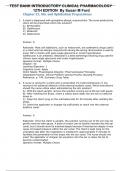
-
Chapter 53, Otic and Ophthalmic Preparations TEST BANK INTRODUCTORY CLINICAL PHARMACOLOGY 12TH EDITION By Susan M Ford
- Exam (elaborations) • 14 pages • 2024
- Available in package deal
-
- $3.19
- 1x sold
- + learn more
1. A client is diagnosed with springtime allergic conjunctivitis. The nurse predicts the client will be prescribed which otic solution? A) Brimonidine B) Gatifloxacin C) Betaxolol D) Nedocromil Answer: D Rationale: Mast cell stabilizers, such as nedocromil, are ophthalmic drugs useful in a client who has allergic conjunctivitis during the spring. Brimonidine is used to lower IOP in clients with open-angle glaucoma or ocular hypertension. Gatifloxacin is an antibiotic. Betaxolol is a be...
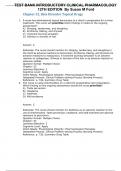
-
Chapter 52, Skin Disorder Topical Drugs TEST BANK INTRODUCTORY CLINICAL PHARMACOLOGY 12TH EDITION By Susan M Ford
- Exam (elaborations) • 15 pages • 2024
- Available in package deal
-
- $3.24
- 1x sold
- + learn more
1. A nurse has administered topical benzocaine to a client in preparation for a minor treatment. The nurse will prioritize which findings if noted on the ongoing assessment? A) Stinging, tenderness, and sloughing B) Erythema, flaking, and dryness C) Transient burning sensation D) Oiliness or dryness of hair Answer: A Rationale: The nurse should monitor for stinging, tenderness, and sloughing in the client as adverse reactions to benzocaine. Erythema, flaking, and dryness are adverse re...
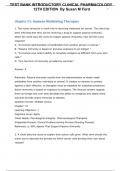
-
Chapter 51: Immune Modulating Therapies TEST BANK INTRODUCTORY CLINICAL PHARMACOLOGY 12TH EDITION By Susan M Ford
- Exam (elaborations) • 15 pages • 2024
- Available in package deal
-
- $3.29
- + learn more
1. The nurse caring for a client who is receiving treatment for cancer. The client has been informed that they will be receiving a drug to support passive immunity. When the client asks the nurse to explain passive immunity, how will the nurse respond? A. “It involves administration of antibodies from another person or animal.” B. “Passive immunity is based on previous exposure to an antigen.” C. “It involves your body’s ability to recognize antigens as different from your own ...
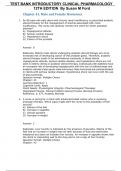
-
Chapter 43, Male and Female Hormones TEST BANK INTRODUCTORY CLINICAL PHARMACOLOGY 12TH EDITION By Susan M Ford
- Exam (elaborations) • 15 pages • 2024
- Available in package deal
-
- $3.39
- + learn more
1. An 80-year-old male client with chronic renal insufficiency is prescribed anabolic steroid therapy for the management of anemia associated with renal insufficiency. The nurse will carefully monitor the client for which potential disorder? A) Hypoglycemic attacks B) Serious cardiac disease C) Hypotensive shock D) Cancer of the prostate Answer: D Rationale: Elderly male clients undergoing anabolic steroid therapy are at an increased risk of developing cancer of the prostate gland. The...

That summary you just bought made someone very happy. Also get paid weekly? Sell your study resources on Stuvia! Discover all about earning on Stuvia


